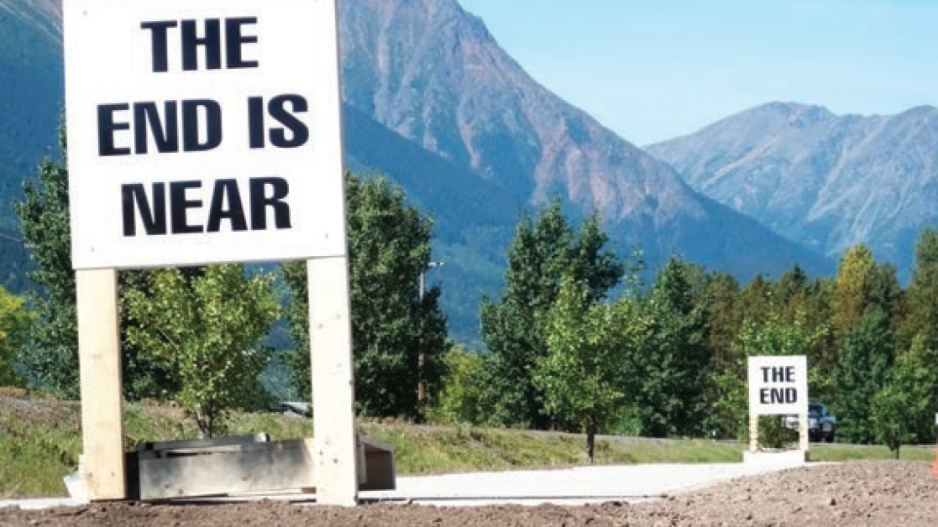What began as a national embarrassment for a northern B.C. town has become a policy-changer that makes Smithers town council a model for progressive democracy.
Who says you can’t fight city hall?
One year ago, the Canadian Federation of Independent Business (CFIB) sarcastically bestowed Smithers council a Paperweight Award, which annually goes to governments or agencies that create needless, often ridiculous, red tape. Council earned the award for forcing North Central Plumbing and Heating, in a 2016 renovation of its Highway 16 frontage road business, to build a $10,000 sidewalk, located some distance from the North Central building, which ended abruptly without connecting to any other walkway.
The company’s business manager, Trevor Bruintjes, called it the “sidewalk to nowhere,” decorating it with a sign reading, “The end is near.”
After being the brunt of many digs from stand-up comedians, Smithers Mayor Taylor Bachrach decided to make changes.
First, council raised the dollar amount of a renovation that triggers the controversial Subdivision Servicing Bylaw to $100,000 from $75,000. Then, last November, it unanimously passed a Bachrach motion to have a cash-in-lieu clause in the bylaw, whereby developers facing situations where building short sidewalks is impractical can contribute money to the municipality for off-site works such as sidewalks. As the city grows, the fund would then pay for integrated walkways. Once the clause becomes law, likely this year, no more sidewalks to nowhere.
“Standards change over time, and overall the vision is to bring the entire community up to a modern development standard,” said Bachrach, speaking from an airplane. “A lot of change has a functional purpose. It’s about moving water or moving people, and it’s about safety.”
However, Smithers has not escaped the scorn of CFIB, which just named the town council a recipient of a second Paperweight, for making a non-profit organization build a sidewalk as part of its redevelopment.
The Bulkley Valley Child Development Centre is undergoing a large renovation to move two facilities into a new location at an old church on 7th Avenue. The non-profit, which serves more than 450 children a year, is trying to raise $995,000 for the renovation in a campaign it calls Project Pinwheel. It has raised $123,000 to date.
“The [non-profit’s] sidewalk is quite different from the one on the frontage road,” said Bachrach. “It does connect to other sidewalks.”
He added that council granted the non-profit a variance, by not requiring it to build a sidewalk on one side of the property.
Richard Truscott, CFIB vice-president for B.C. and Alberta, said British Columbia is probably the best province for government agencies reducing red tape.
“We see improvements in certain parts of the country, and certainly B.C. deserves credit,” said Truscott, referring primarily to the provincial government.
Still, there are lots of areas for improvement.
Among the 14 2018 Paperweight recipients are the National Capital Commission (NCC), for making children who set up a lemonade stand sign a two-page waiver indemnifying NCC of any legal liability, and the Ontario Ministry of Labour, for forcing a contractor to buy a new ladder because his existing ladder’s label was worn away.
“This is just the tip of the iceberg,” said Truscott. “There are dozens of other horror stories we simply didn’t have time to report on.”
A CFIB survey of 7,823 independent Canadian business owners conducted last fall and published January 22 states that businesses spent $10 billion dealing with red tape. A breakdown of costs states that businesses with fewer than five employees spent $6,744 per employee. Those with 100 or more employees, that have people to deal specifically in this area, spent $1,253 per employee.
“Business owners,” stated Truscott, “are busy ticking boxes on forms and surfing multitudes of websites or waiting for answers from government and not doing what they’re passionate about, which is running their business, creating jobs and supporting their local communities.” •




